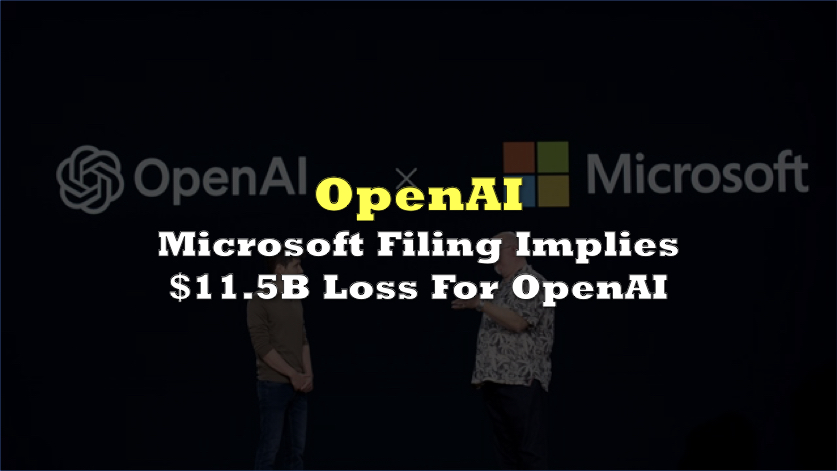Microsoft (NASDAQ: MSFT) disclosed a $3.1 billion reduction to quarterly net income from its OpenAI investment for the three months ended September 30, 2025, which implies OpenAI lost roughly $11.5 billion in the period based on Microsoft’s 27% ownership.
The impact was also $0.41 off diluted EPS, according to Microsoft’s fiscal Q1 FY2026 materials.
Microsoft accounts for OpenAI under the equity method, which means Microsoft’s income statement reflects its proportionate share of OpenAI’s profit or loss. The company’s filing further shows $4.1 billion flowing through other income and expenses tied to investments in the period, reinforcing the scale of the drag.
Microsoft’s latest SEC filing quietly exposed that OpenAI lost around $11.5 billion last quarter, based on Microsoft’s 27% ownership stake and a $3.1 billion hit to its own net income.
— Chubby♨️ (@kimmonismus) October 30, 2025
The filings confirm that Microsoft has funded $11.6B of its $13B commitment to OpenAI, with… pic.twitter.com/lMl3wptM8H
The financial hit arrives as Microsoft confirms it has funded $11.6 billion of its $13 billion commitment to OpenAI and as OpenAI completes a restructuring into OpenAI Group PBC with the OpenAI Foundation retaining control. The new deal sets Microsoft’s stake at about 27% and removes earlier constraints on OpenAI’s ability to raise capital. Reuters reported the shuffle coincided with Microsoft’s valuation topping $4 trillion. 
Top line momentum at OpenAI has not offset expenses. OpenAI generated about $4.3 billion in revenue in the first half of 2025, up roughly 16% versus all of 2024, yet it continued to burn significant cash to fund model training, data centers, and go-to-market. The Information’s figures, relayed by Reuters, describe substantial R&D and operating outlays, while the Financial Times separately summarized an operating loss near $7.8 billion for the first half.
This disclosure comes after it was reported that the firm is laying groundwork to file for an initial public offering valued at up to $1 trillion as early as the second half of 2026. In October, the Bank of England’s Financial Policy Committee warned that equity valuations look stretched, particularly for AI-focused technology companies, and that markets are vulnerable to a sharp correction if sentiment fades.
Information for this story was found via The Register and the sources mentioned. The author has no securities or affiliations related to the organizations discussed. Not a recommendation to buy or sell. Always do additional research and consult a professional before purchasing a security. The author holds no licenses.









